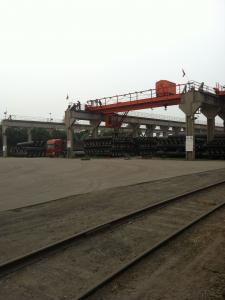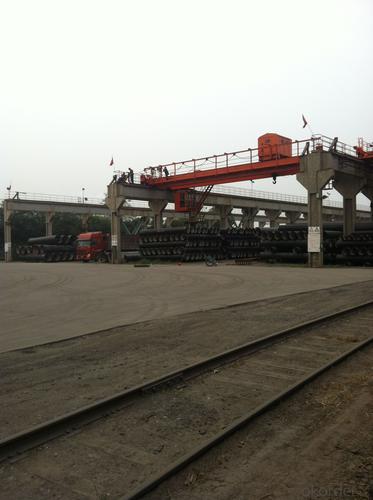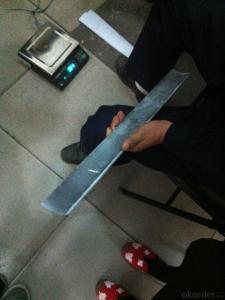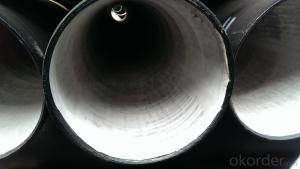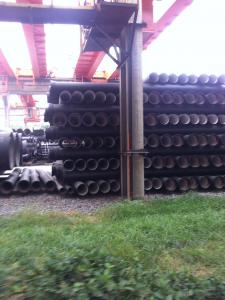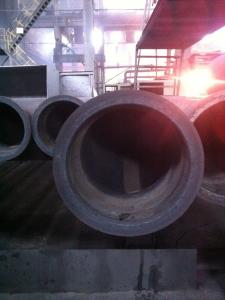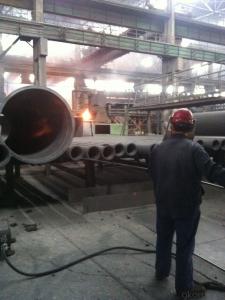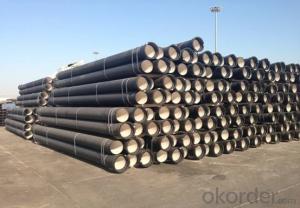DUCTILE IRON PIPES AND PIPE FITTINGS K9 CLASS DN1200
- Loading Port:
- Tianjin
- Payment Terms:
- TT OR LC
- Min Order Qty:
- 22 pc
- Supply Capability:
- 3000 pc/month
OKorder Service Pledge
OKorder Financial Service
You Might Also Like
Material : Ductile Cast Iron
Size Range : DN 80mm to DN 2000mm
Unit Effective Length : 6m or 5.7m
Manufacture Standard: ISO 2531:1998/ EN 545:2006/EN 598:2007
Annual capacity : 200,000 tons
Coating Exterior: Zinc 130g/m2 according to ISO 8179-1 and bitumen coating 70 microns.
Cement Interior: Portland Cement/ High Alumina Cement/ Sulphate Resisting Cement Lining according to ISO 4179
Special requirements on external coating and internal lining can be applied
We also provide accessories such as SBR/EPDM rubber gaskets, lubricant paste, pipe caps, PE sleeves, etc.
Additional Parts:
Each pipe is strictly inspected according to related standard to ensure permanently high performance.
Easy Installation at site and service free for life
Long Service Lifespan
Quotation will arrive you within 24hours once we get your inquiry.
We guarantee offering you a competitive price.
A copy of original inspection reports of pipes will be offered after shipment.
Photos of loading process will be sent to the customer after shipment effect.
We will follow-up the delivery progress after shipment effect and update to the customer on weekly basis.
- Q: Are ductile iron pipes suitable for use in irrigation gate systems?
- Yes, ductile iron pipes are suitable for use in irrigation gate systems. Ductile iron is known for its durability, strength, and corrosion resistance, making it an ideal choice for applications requiring reliable and long-lasting piping systems like irrigation gate systems. Additionally, ductile iron pipes have excellent flow characteristics, allowing for efficient water distribution in irrigation systems.
- Q: Are there any special coatings or linings used for ductile iron pipes?
- Yes, there are special coatings and linings used for ductile iron pipes. These coatings are applied to the interior and exterior surfaces of the pipes to protect them from corrosion and extend their lifespan. Common coatings include cement mortar lining, epoxy lining, and polyethylene encasement. These protective layers help prevent the formation of rust and scale, ensuring the durability and longevity of ductile iron pipes.
- Q: Can ductile iron pipe be used for geothermal heat exchange systems?
- Yes, ductile iron pipe can be used for geothermal heat exchange systems. Ductile iron pipe is known for its strength and durability, making it suitable for underground applications such as geothermal heat exchange systems. Additionally, it has good corrosion resistance and can withstand high temperatures, which are important factors in geothermal systems.
- Q: Are ductile iron pipes resistant to chemical attacks?
- Yes, ductile iron pipes are generally resistant to chemical attacks. Ductile iron is known for its high corrosion resistance, making it suitable for a wide range of applications including water and wastewater systems. Ductile iron pipes are typically lined with a protective coating such as cement mortar or epoxy to further enhance their resistance to chemical attacks. This lining acts as a barrier between the pipe material and the corrosive substances, preventing any degradation of the iron. However, it is important to note that the level of resistance can vary depending on the specific chemical being transported and the concentration and temperature of the solution. Therefore, it is always advisable to consult with experts or engineers to ensure the suitability of ductile iron pipes for specific chemical environments.
- Q: Method for cutting cast iron pipe
- I don't know the diameter and length of the cast iron tube. The small diameter can be made of a huge bed. The short one can also be lathe. The lathe is very flat
- Q: What are the specifications for the installation of water ball iron pipes?
- The T type interface pipe shall be supported by a pier in the vertical or horizontal direction. The size of the pier should be calculated according to the factors such as pipe diameter, angle of rotation and working pressure. 4, the transmission of drinking water, the pipeline should not pass through the poison contaminated areas, such as the need to pass through, should take protective measures.
- Q: Can ductile iron pipes be used for wastewater reuse projects?
- Yes, ductile iron pipes can be used for wastewater reuse projects. Ductile iron pipes have several properties that make them suitable for such projects. Firstly, they have high strength and durability, which allows them to withstand the pressure and load requirements of wastewater systems. Additionally, ductile iron pipes have excellent corrosion resistance, which is important in wastewater applications where the presence of chemicals and corrosive substances is common. Furthermore, ductile iron pipes have a smooth internal lining, which reduces friction and improves the flow of wastewater. This is crucial for efficient transportation and distribution of wastewater in reuse projects. Moreover, ductile iron pipes are also known for their ease of installation and maintenance. They can be easily connected using various joint options, allowing for quick and efficient installation. Additionally, ductile iron pipes have a long service life, reducing the need for frequent replacements and minimizing maintenance costs. Overall, the properties of ductile iron pipes make them a suitable choice for wastewater reuse projects, providing strength, durability, corrosion resistance, smooth flow, and ease of installation and maintenance.
- Q: Can ductile iron pipes be used for stormwater management?
- Certainly, stormwater management can make use of ductile iron pipes. Ductile iron, being a robust and enduring material, possesses resistance against corrosion and can endure the high rates of flow and pressure typically linked with stormwater management systems. These pipes have found extensive application across various fields, including stormwater drainage and sewage systems. Their capacity to handle substantial loads and endure environmental factors renders them an appropriate option for stormwater management, guaranteeing the smooth flow of water and averting flooding in urban regions. In addition, ductile iron pipes boast a lengthy lifespan, minimizing the necessity for frequent maintenance and replacement, thus proving to be a cost-effective selection for stormwater management infrastructure.
- Q: Ductile iron pipe, socket connection, pipe length, you can cut open it?
- Yes, but the pipe that needs cutting is a cut off pipe with a scissors mark.
- Q: What is the expected pressure class for ductile iron pipes?
- The pressure class anticipated for ductile iron pipes may differ based on the particular use and project needs. In a general sense, ductile iron pipes are engineered to manage high-pressure situations and are typically offered in pressure classes spanning from 150 psi to 350 psi. These pressure classes signify the utmost operational pressure that the pipe can endure while preserving its structural soundness. To ascertain the suitable pressure class for ductile iron pipes in a specific scenario, it is crucial to refer to industry standards, guidelines, and project specifications.
Send your message to us
DUCTILE IRON PIPES AND PIPE FITTINGS K9 CLASS DN1200
- Loading Port:
- Tianjin
- Payment Terms:
- TT OR LC
- Min Order Qty:
- 22 pc
- Supply Capability:
- 3000 pc/month
OKorder Service Pledge
OKorder Financial Service
Similar products
Hot products
Hot Searches
Related keywords
